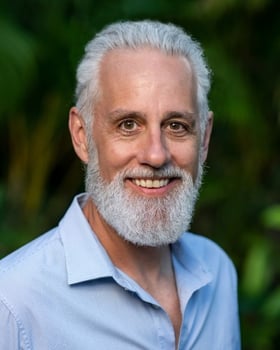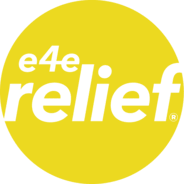Studies show that employees who engage in corporate volunteer programs experience improved well-being: they’re happier and more productive on the job. In fact, another of our partners, Bonterra, reports corporations or businesses with employee volunteer programs enjoy five times more engagement than their equivalents without them and corporations with leadership that offers volunteer time off for their employees to contribute positively to their communities reduced their turnover by 50% and increased productivity by 13%.
 We recently sat down with Chris Jarvis, co-founder and CSO of Realized Worth and the RW Institute. Chris and the Realized Worth team represent the preeminent thinkers who have reimagined corporate citizenship and employee volunteerism and giving. Our conversation with Chris not only delighted us, but also gave us a zeroed-in view about the neuroscience behind volunteering and how Realized Worth’s focus is on mitigating low employee engagement with innovative ideating that translates to actionable results.
We recently sat down with Chris Jarvis, co-founder and CSO of Realized Worth and the RW Institute. Chris and the Realized Worth team represent the preeminent thinkers who have reimagined corporate citizenship and employee volunteerism and giving. Our conversation with Chris not only delighted us, but also gave us a zeroed-in view about the neuroscience behind volunteering and how Realized Worth’s focus is on mitigating low employee engagement with innovative ideating that translates to actionable results.
With an impressive client list that includes Verizon, Microsoft, Walmart and Toyota, Realized Worth’s proof is most certainly in its secret sauce: placing a premium on human capital.
It's fascinating, meaningful work, and we’re excited to share what we learned from a renowned corporate stewardship subject matter expert.
Below are excerpts from our conversation, edited for brevity and clarity.
E4E Relief: For people who don't know you, give us an overview of what you do and what kind of companies you usually work with.
Chris Jarvis: We work with companies on designing and implementing volunteer programs. Our focus with companies is not on event management. We solve the problem of facilitating employee engagement in volunteer programs. We help corporations and nonprofits make ideas work by implementing foundational frameworks around the three stages in the journey of a volunteer. We base our work on science and academic approaches that we have collected and used including Transformative Learning Theory, which is all about changing the perspective of why we do things. We have found this understanding is necessary to increase engagement in all these great volunteer programs.
E4E Relief: Share a bit about what kind of leaders come to Realized Worth for guidance.
Chris Jarvis: Typically, we talk to Corporate Citizenship professionals. What we're doing is quite a bit broader than volunteering or workplace giving, but that tends to be where most people want to start the conversation with us.
Most of the people who approach us sit under in Legal, HR, Finance, or they work within the Foundation. Often the people that we're talking to are new to the field. And the field is still evolving. Doing the work we do with companies and nonprofits is seen as a legacy opportunity.
E4E Relief: You've really begun to encourage so many organizations to move away from checking the box; they're really connecting to the purpose of deeper realized outcomes. Why did you choose to take this work on?
Chris Jarvis: My partner and I started this work based on our experience as volunteers along with our work at nonprofit and volunteer-enabling organizations. We both had our version of an epiphany where we asked ourselves a new question. For me, that question was, ‘If what I believe is true isn't good for everybody, is it good for anybody?’ So, that's my starting point for this journey.
What I'm trying to do with Realized Worth is offer people an invitation to the same space so they can hear their version of that question. It offers a bit of agency about your own existence and why you're here on the planet. That conversation can look like: ‘What's my contribution? I want to own my contribution. I don't want to do this just because someone told me to do it, or because I was taught it was the right thing to do.’
It's called emancipatory knowledge. Emancipatory knowledge is the ability to step outside of your rubric from which you see the world and say, ‘Do I want to see it that way?’ That's what we're trying to offer.
E4E Relief: What are some current challenges around volunteerism and creating an environment where people are more closely connected to why they're doing what they're doing?
Chris Jarvis: I would say the challenges are low participation rates, which are in the 30 to 33% range. I think the other thing that people struggle with is when the participation remains the same year over year. Probably the greatest challenge for these leaders is access to resources – both human and financial – sometimes it seems like they are being expected to stir the workforce engagement pot with a toothpick. These persistent challenges will likely continue without a significant shift in approach and leadership mindsets.
E4E Relief: You introduced us to Social REV last year. Tell us more about what members can find there, and how it has been received.
Chris Jarvis: SocialREV is an online platform, powered by Backstage, that provides social impact professionals light coaching and consulting along with resources and support to enhance their work in Corporate Social Responsibility (CSR), Community Investment or ESG practices. It is not currently intended for individual volunteers or non-profits, but it offers a wide range of resources including frameworks, process guides, tools, templates, and courses to help professionals in their social impact work. The courses available on Social REV, such as the Corporate Social Impact 101 course, cover various topics including the history of social impact/CSR, indicators of success in social impact, elevating a social impact career and transformative volunteering.
One of Social REV’s key features is the ongoing release of new resources. Users can expect regular updates and additions to the platform, so they can always have access to the latest tools and information in the field of social impact.
E4E Relief: What is your advice for making employee volunteer programs scalable, measurable and meaningful?
Chris Jarvis: Mimic exactly what you see in nature. You know those massive groups of starlings you see at sunset? They’re called murmurations. One starling influences the seven around it, so, when one moves, the seven move, and those seven are connected to seven others. Google once reported a group of 1.2 million over their complex! It’s about focusing on small influential groups rather than mass engagement. You lead at mass by paying attention to the small groups. Focus on 200, not 200,000. They'll look after the rest.
E4E Relief: What are some of the metrics executives expect so they can justify CSR programs?
Chris Jarvis: Most executives still care about simple outputs, so we try to talk through that, but I would argue that the most important metrics are psychological, convictional and behavioral shifts in employees.
E4E Relief: Finally, what are some new Realized Worth projects and partnerships?
Chris Jarvis: We're going to be announcing our RW Institute Communities. These are communities of individuals, creators, and contributors who are going to coalesce around concepts. One of them will be either technology (like AI in the workplace), or it's going to be conceptual (for example, resilience).
My goal is to start with this community approach to bring these ideas into the broader network of stage two and stage three individuals versus just the CSR manager. There's only a few hundred of them, but I need tens of thousands of champions from around the world to come together and move the needle on issues that will either hold us back or catapult us forward.


